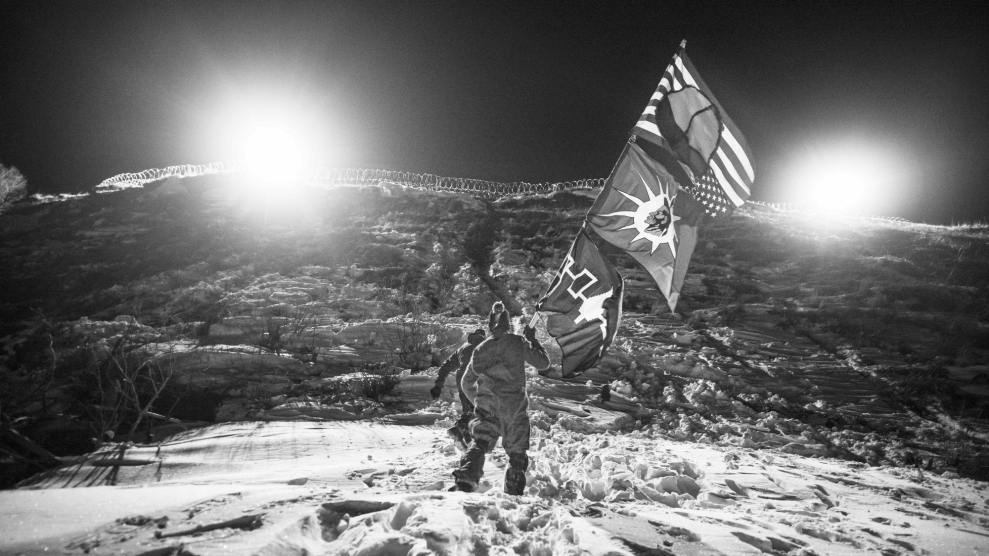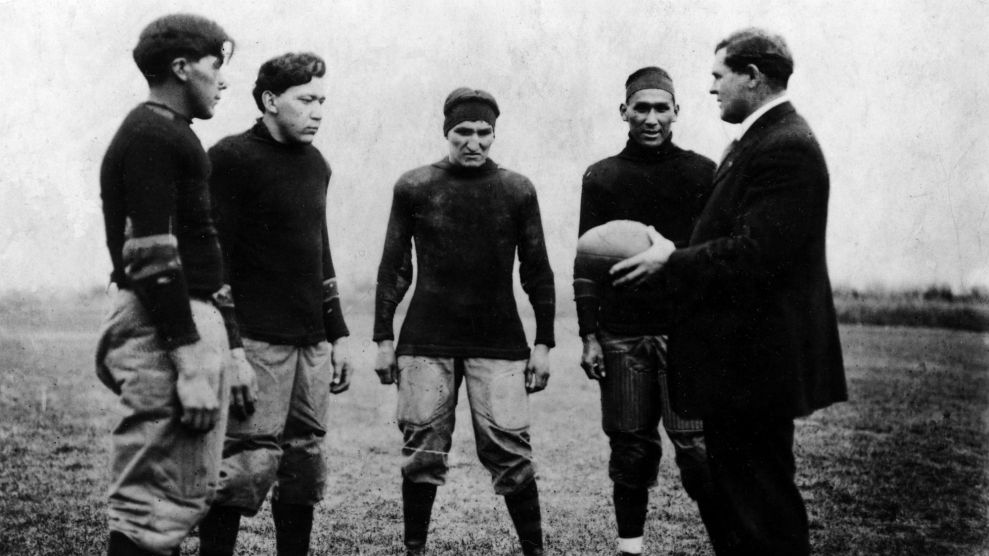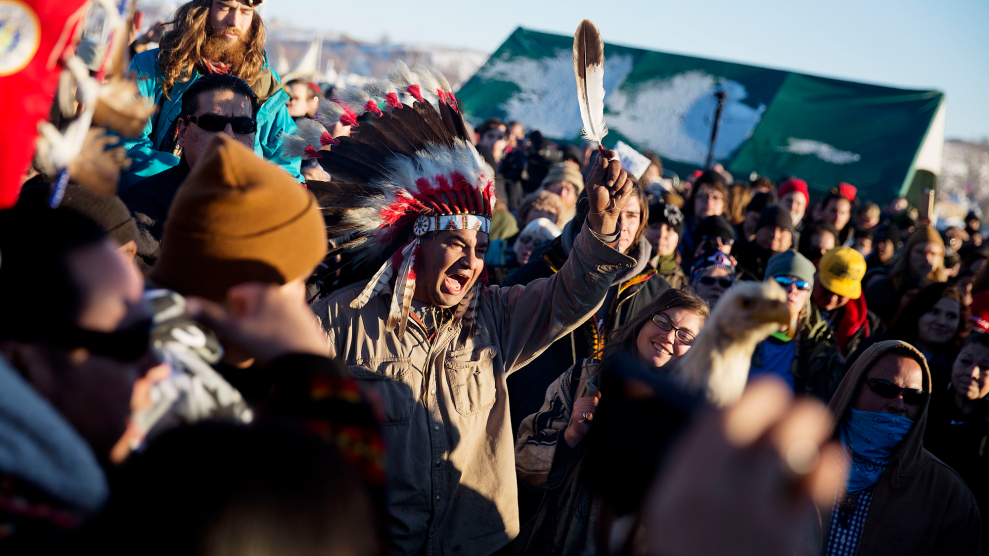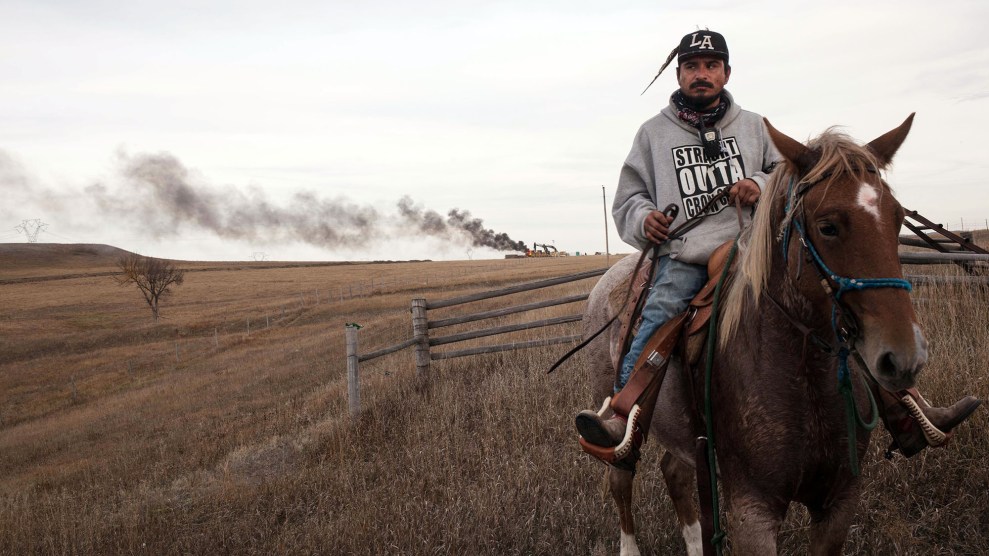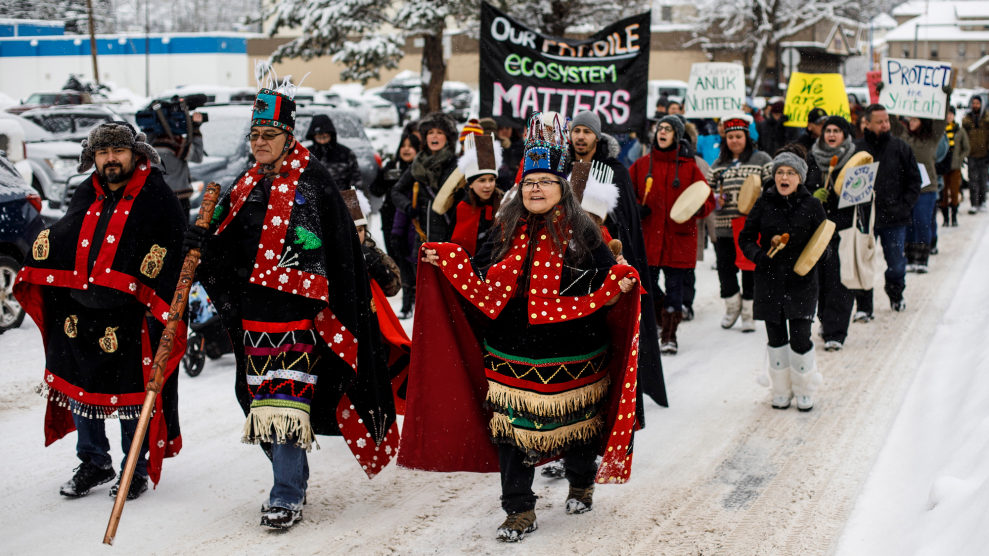
Wet'suwet'en hereditary chiefs lead a rally in British Columbia, on Jan. 10, 2020. Jason Franson/AP
This week, activists across Canada ground railways to a halt, barred provincial legislatures from meeting, and blockaded ports to demonstrate support for Indigenous land rights. At the center of the battle are three First Nations women from a remote village in British Columbia who were arrested on Monday to clear the way for a natural gas pipeline to be built on their people’s traditional territory.
Ten years ago, Freda Huson, also known as Chief Howihkat of the Wet’suwet’en people, built a cabin in the woods, founding the Unist’ot’en village so she and her relatives could be closer to the lands where their ancestors lived and trapped fur. “My family was trapping in that area long before the road was built,” says Huson. Concerned that development would threaten the headwaters where salmon spawn, and from which the village drinks, Huson positioned her cabin to obstruct the route of a natural gas pipeline that multinational energy giant Enbridge planned to build.
The Enbridge project was scrapped in 2016, and the woods became the Wet’suwet’en’s. What was built in part as a pipeline protest encampment became the permanent residence of Huson and a handful of other people from her nation and others.
Around that time, Karla Tait, a psychologist and Huson’s niece, founded a Healing Centre in Unist’ot’en, which offers a summer art camp for children as well as lessons on gathering traditional medicines and foods. The Centre is an antidote to the substance abuse issues and high suicide risk that Indigenous people face. “We now know through research that the most resiliency-promoting, protective practices Indigenous people can engage in are cultural practices,” she says. But “because of municipal encroachment and the activities of industry in this expanse of Wet’suwet’en territory, there is very little remaining that can support the land-based practices that our ancestors enjoyed.” Each year, hundreds of First Nations people from all over Canada travel to visit the Centre.
“The work that we’re doing there is not in opposition to a pipeline,” says Tait.
Yet despite the defeat of Enbridge, pipelines remain a central concern at Unist’ot’en. In 2012, TC Energy—the Canadian company pushing Keystone XL in the US—announced its intention to build a pipeline in the heart of Wet’suwet’en territory.
While Canadian courts are claiming jurisdiction over that land, it remains under de facto Indigenous control. Like many First Nations in Canada, the Wet’su’wet’en never signed away their land rights by treaty. Lawyers for the Wet’suwet’en hold that their “Aboriginal title…takes precedence over [Canada’s] underlying interest in the land,” and that the village is rightfully theirs.
But a Canadian court ruled in 2018 that neither the Wet’suwet’en nor anyone else could impede the pipeline’s construction. Canadian police on Monday arrested seven people who were staying at Unist’ot’en, including Huson, Tait, and Brenda Michell (Huson’s sister, whose Wet’suwet’en name is Chief Geltiy).
When police arrived, Tait and Chiefs Geltiy and Howihkat were performing a ceremony to honor missing and murdered Indigenous women, many of whom have been lost to the violent trafficking that occurs around pipeline construction sites. The ceremony included a symbolic cremation of the “Canadian Indigenous Reconciliation industry,” referencing a popular position embraced by Prime Minister Justin Trudeau that seeks to reconcile Canadian institutions with the First Nations people they colonized. To make the arrests, Royal Canadian Mounted Police officers hacked through a gate that land defenders labeled “Reconciliation.” The hashtag #ReconciliationIsDead soon trended on social media.
Don't ever forget these images. Colonial violence lives, whether it's mounties and residential schools or RCMP with sound cannons and assault rifles forcibly removing Indigenous people from their own territory. This war is led by our govt #cdnpoli @jjhorgan #ReconciliationIsDead pic.twitter.com/EntRejgk5c
— Anna Gerrard (@_AnnaGerrard) February 10, 2020
The arrests sparked a chain reaction throughout Canada, with First Nations people and their supporters barricading entrances to British Columbia’s legislature, closing off roadways in Calgary and Ottawa, and launching a nationwide blockade of ports and railways that shows no sign of letting up.
Proponents of reconciliation are “talking about what’s good for our people, like social services and education, but they have never once mentioned the return of our lands,” says Tekarontake, an elder of the Kahnawake Mohawk people who are Indigenous to lands in eastern Canada. Many Mohawks are rising alongside other First Nations people to support Unist’ot’en because they see the recent police invasion as proving that “reconciliation is all just talk,” says Tekarontake. “Meanwhile, some of our people are dying from lack of clean water.”
Days before police removed Wet’suwet’en women from their homeland, Tekarontake and other Mohawks started barricading rail lines around Montreal and Toronto to protest construction. Kahentinetha Horn, an elder in the Mohawk Nation’s Spitting Bear Clan, helped throw the first lawn chair on a railway near the Kahnawake community last Thursday night, an image that prompted others to follow suit. “We shut down railways and highways because they’re just like the pipelines,” says Horn. “They transport Native-owned resources that we’ve never given up.”
Horn learned about the pipeline from a Wet’suwet’en presentation in her community two years ago. She remembers thinking, “it’s always the same story.” Like many, she draws parallels between Unist’ot’en and the 1990 Oka crisis, an armed 78-day land dispute between Mohawks and Canadian government forces that inspired solidarity actions across the continent. When Canadian police “launched a military-style attack” on the Wet’suwet’en, says Horn, “we told them, ‘we’re going to stand with you,’ because we dealt with the same situation. As Indigenous people, we don’t fight until we die. We fight until we win.”
As Mohawks and others continued to blockade strategic locations, ignoring court orders to cease, two of Canada’s biggest rail companies canceled much of their passenger train service on Thursday, while Trudeau’s office dispatched the Crown-Indigenous Relations Minister to meet with Wet’suwet’en chiefs. “There is no more important relationship to me and to Canada than the one with Indigenous peoples,” wrote Trudeau, adding that he was eager “to discuss the current situation and to see a process that avoids such situations in the future.”
Tekarontake says there’s been enough discussion. “If Canada wants to resolve this problem—if they want the railroad and all that to open up— all they gotta do is stop this pipeline,” he says. The Mohawks of Tyendinaga, who have been blocking service on one of Canada’s busiest rail lines in southern Ontario, have said that they won’t relent until the Royal Canadian Mounted Police leave Wet’su’weten territory.
As for the Wet’su’weten women, they returned to their home community in Houston, British Columbia following release, where they’ve been holding feasts, a traditional governance structure, to strategize what they’ll do next. After vacating the village, police escorted construction vehicles past Unist’ot’en to begin early construction activities in an area that Wet’su’weten presence had previously prevented them for reaching. While Trudeau and his ministers press for a stand-down, support actions and disruptions continue across Canada.
For Huson, these developments are frustrating but not surprising. “The Canadian police were created to keep the Indigenous people off their lands, and that’s what they were used for this week,” she says. “How can you have reconciliation when the whole system is lopsided, working against our people and in favor of corporations? That’s why we developed the Healing Centre. If people are connected to their lands, they wouldn’t sign deals that could destroy that land. No amount of money would allow you to do that.”

